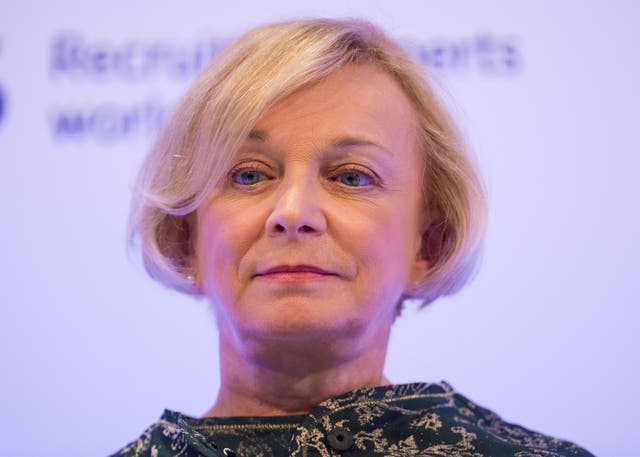
Royal Mail shareholders have voted against the firm’s plan for directors’ pay after a row over a salary rise for its new Zurich-based boss.
The directors’ remuneration report (DRR) was rejected in a vote declared at its annual general meeting in Sheffield on Thursday, with 70% of proxy shareholders voting against the package.
The board responded to the vote, which is not binding, saying it will consult further as it reviews its remuneration policy later this year.
Investor advisory firms ISS and Glass Lewis suggested shareholders vote against the remuneration report, in part because newly appointed chief executive Rico Back is set to receive a higher salary than outgoing boss Moya Greene.
Mr Back is being paid a £640,000 annual salary, £100,000 more than his predecessor.
But chairman Peter Long told the sparsely attended meeting that differences in pension arrangements meant his “fixed pay” will be “exactly the same” as Ms Greene’s.
Mr Back has decided to stay in Zurich, Switzerland, with plans to commute regularly to work at Royal Mail’s London headquarters.
Royal Mail stressed that he had been living in Zurich with his family for more than 10 years and will pay full UK tax on all of his earnings including bonus payments.
After the meeting, the board’s remuneration committee chairwoman, Orna Ni-Chionna, said: “We are very disappointed that the advisory vote on the DRR was not carried.
“We have worked hard since becoming a public company to take a highly responsible approach to executive pay and have enjoyed strong support from our shareholders on all remuneration matters until this vote.
“We recognise and understand the reasons why our shareholders felt they could not vote in favour of the DRR this year.
“We have already been in contact with many of them and will reflect very carefully on their main concerns. We will consult very closely with them and with the shareholder representative bodies as part of our scheduled review of the company’s remuneration policy. This is due to take place in the autumn.
“In our engagement with shareholders, we explained that the retiring CEO’s and the incoming CEO’s overall fixed cash remuneration – their base salary, pension entitlements and benefits – are broadly the same.
“The incoming CEO’s pension entitlement is lower and the salary is higher than the retiring CEO. We did not feel it was appropriate to reduce the fixed pay for this very demanding role.
“Any potential increase in Rico Back’s variable pay is subject to meeting stringent performance conditions.”
The proxy votes declared at the AGM were 70.18% against the directors’ remuneration report with 29.82% for.
Royal Mail made headlines for paying a near-£6 million “golden hello” to Mr Back, when he joined from General Logistics Systems (GLS) – Royal Mail’s European parcels business, last month.
There was only one question from the floor at the AGM about Mr Back’s package and his decision to stay in Switzerland.
Alan Tate, from the Communication Workers Union, asked the chairman whether he was concerned that the publicity around Mr Back’s decision to live in Zurich could affect the share price or dent the workforce’s confidence in him.
Mr Long replied: “There’s no doubt in terms of Rico’s loyalty and to be in the right place and at the right time”.
“This is an international company so he travels all round the world.”
Earlier, Mr Long told the AGM that the new chief executive was “ideally placed” to lead the company.
In a statement on Thursday morning, Royal Mail said: “Rico will use appropriate scheduled commercial flights when travelling directly between Zurich and London.
“He will personally bear the costs for these flights and his accommodation in London.”

ISS raised a red flag over Ms Green’s payouts, which include a full-year cash bonus of £774,000 as she heads out of the door.
“It is not market practice for a departing director to receive a guaranteed bonus payment upon termination,” ISS said.
“However, more concerning is that she gave her notice in April 2018 to step down in September 2018, and yet she will be receiving 12 months’ salary and bonus from September 2018, instead of from April 2018.”
In terms of Mr Back’s package, ISS highlighted part of Royal Mail’s payment policy in 2016, which said its remuneration committee “recognises that the pension provision is high” and that it would “adopt a lower percentage for newly appointed executive directors”.
“The level of the former CEO’s pension is not considered a compelling reason for a significantly higher base salary for a new executive director,” ISS said.
Glass Lewis also said it had “severe reservations about supporting the remuneration report”.
“Where an increase in base salary is warranted to facilitate recruitment, we would expect this to take the form of phased increases across the lifespan of Mr Back’s term, reflecting concomitant increases in experience and knowledge.”
Earlier this week, Royal Mail reported a 7% fall in letter revenues in the three months to June 24, while UK parcel revenues rose 6%.
This left revenues in the UK division down 1%, while overall group underlying revenues lifted 2% thanks to an 11% surge in turnover at its European parcels business, GLS.
Royal Mail reiterated its warning that it could see a steeper-than-expected drop in letter mailings due to the new General Data Protection Regulation (GDPR) changes and added that it is “monitoring any potential impact closely”.


Comments: Our rules
We want our comments to be a lively and valuable part of our community - a place where readers can debate and engage with the most important local issues. The ability to comment on our stories is a privilege, not a right, however, and that privilege may be withdrawn if it is abused or misused.
Please report any comments that break our rules.
Read the rules here